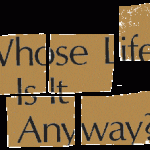Over the years, a typical scenario has unfolded when I meet someone for the first time. “What do you do?” I am asked. “I’m a college professor.” “Oh wow! What do you teach?” “Philosophy.” At that point, one of three things happens:
- “Say something philosophical,” my new acquaintance demands. I generally say something like “When a tree falls in the forest and no one is there, there isn’t any sound (pause), except for the times that there is.” That’s usually an effective conversation stopper.
- “I had a philosophy course once. I hated it.” I confidently reply “that’s because you didn’t have me as a teacher.” I truly believe that I can hook anyone into being interested in philosophy, but it takes time, structure, and almost certainly a setting different than the one in which my new acquaintance and I find ourselves.
- “Cool! I love philosophy! I never took a course, but have studied a lot of philosophy on my own!” Having no idea what might count as “philosophy” for this person, I usually respond by excusing myself in order to get another drink.
Academics run into this sort of thing all the time. In Yes to Life, famed psychoanalyst Viktor Frankl tells the story of a young man who was explaining why he couldn’t attend Frankl’s lecture that evening, a lecture whose announced topic was “the meaning of life.” “Don’t be angry with me; I’ve been invited to my future in-laws tonight,” the young man explained. “I really do have to go, and I can’t stay for your lecture. Please be so kind and tell me quickly, what is the meaning of life?”

One of the hallmarks of Frankl’s work and insights, developed and honed during years of imprisonment at Buchenwald and Auschwitz during WWII (his pregnant wife and unborn child died in the Holocaust), is that this common question—“What is the meaning of life?”—cannot be answered as stated. Indeed, it is entirely the wrong question to be asking.
Frankl illustrates by comparing the young man’s question to a question that a reporter once asked the world chess champion in an interview: “And now, Master, please tell me which chess move do you think is the best?” Of course, there is no answer to such a question, since the “best move” in chess is always defined by the specifics of the game. As Frankl asks, “Is there a move, a particular move, that could be good, or even the best, beyond a very specific concrete game situation, a specific configuration of the pieces?” The answer, obviously, is “no.”
The question to ask about one’s life is not “what is the meaning of life?” as if this were something that could be looked up, verified, and relied on for the future. Instead, Frankl suggests, the proper question is What does life expect of me? What task in life is waiting for me? Many are fond of saying that life is a “gift,” but Frankl argues that life is a “task.”
Living itself means nothing other than being questioned; our whole act of being is nothing more than responding to—of being responsible toward—life.
When a virus continues to limit our lives and opportunities, when our country is exploding with rage and anger over systemic, long-standing, and unaddressed inequality and racism, Frankl’s perspective, honed in the worst of situations, takes on a pressing relevance. How, in these challenging times, can each of us grapple with what Frankl calls “the great fundamental truth of being human—being human is nothing other than being conscious and being responsible”?
Imagine, Frankl suggests, your “specific life circle,” a circle that is defined by your actual circumstances, not by what you wish or hope for, but by what and whom you uniquely are at this specific moment in time. In response to a question that many of ask—“in the great scheme of things, what can I do? What difference can I make?”—Frankl says that
It is never a question of where someone is in life or which profession he is in. It is only a matter of how he fills his place, his circle. Whether a life is fulfilled doesn’t depend on how great one’s range of action is, but rather only on whether the circle is filled out.
The question is always “What is life requiring of me today, in this unique situation, these specific circumstances?”
It was this perspective and these questions that made it possible for Frankl and other fellow prisoners to live meaningful lives in a Nazi death camp. Their specific life circles were very small, limited in ways unimaginable to those who never experienced such circumstances, but each day Frankl asked what life was asking of him that day, a task that only he could uniquely carry out.
In his specific life circle, every single human being is irreplaceable and inimitable, and that is true for everyone. The tasks that his life imposes are only for him, and only he is required to fulfill them. And a person who has not completely filled his (relatively) larger circle remains more unfulfilled than that of a person whose more closely drawn circle is sufficient.
In both Mark’s and Luke’s gospels, we are told a story that illustrates what Frankl has in mind. Jesus and his disciples are observing various people putting money into the collection box at the temple; “many who were rich put in much.” One can imagine that some of the rich contributors gave their money in such a way as to guarantee that others would be impressed by the amount of the donation. But then a poor widow deposits “two mites” in the box, an amount embarrassingly small compared to what others have contributed. Jesus comments that
This poor widow has put in more than all; for all these out of their abundance have put in offerings for God, but she out of her poverty has put in all the livelihood that she had.
The widow’s life circle is small, but she has filled it out completely by giving all that she had. She has responded fully to life’s question, not by wishing that she had more to give, but rather by giving what she had.
This is why self-knowledge, both of one’s abilities and one’s limitations, is so important—especially during times when the larger world is swirling more and more out of control. Michel de Montaigne lived during such a time, in a world swept up in religious civil wars. He knew that many people felt helpless in the face of a world gone mad; in his essays, he always turns himself and his reader toward the “life circle.”
I have done nothing today,” you say. What, have you not lived? That is not only the fundamental but the most illustrious of your occupations . . . Have you been able to think out and manage your own life? You have done the greatest task of all . . . To compose our character is our duty, not to compose books, and to win, not battles and provinces, but order and tranquility in our conduct. Our great and glorious masterpiece is to live appropriately.












